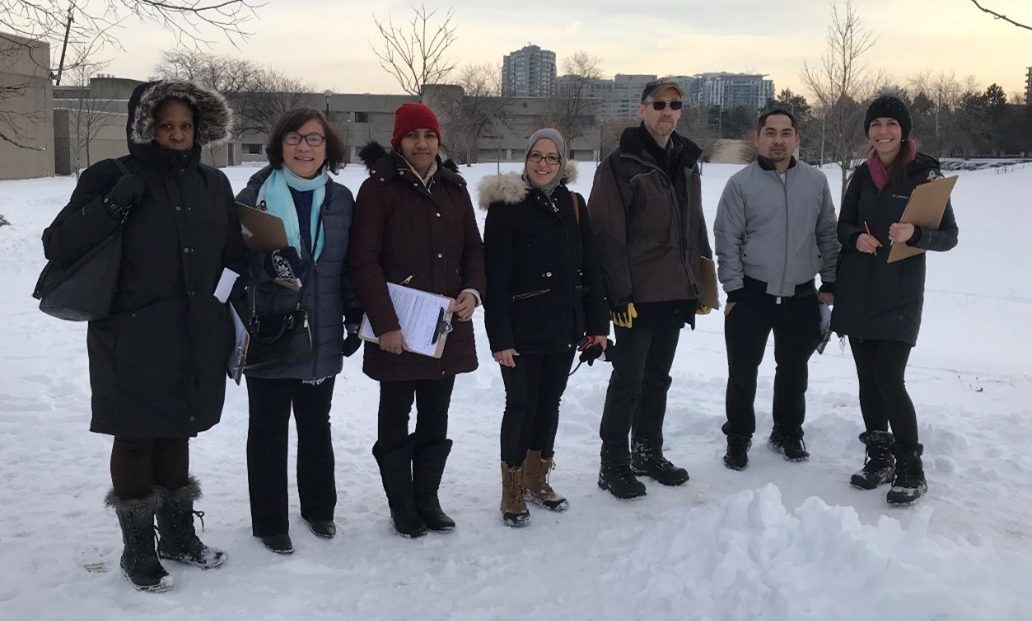Toronto School Travel Planning
Green Communities Canada has been providing School Travel Planning (STP) services in Toronto for more than 10 years on behalf of the Toronto District School Board (TDSB) and the Toronto Catholic District School Board (TCDSB). We customize the program to suit the goals and needs of each school board, and typically provide direct support to 20 – 30 schools in the city each year. The key goals of the Toronto School Travel Planning work are to encourage more children to walk and cycle to school, and to reduce traffic congestion and improve traffic safety around schools.
School Travel Planning is a collaborative process and our work in Toronto could not be successful without the support of many partner organizations and elected officials, including:
- Toronto District School Board
- Toronto Catholic District School Board
- Toronto Public Health
- City of Toronto – Transportation Services
- City of Toronto – School Crossing Guard Program
- Toronto Police Service
- Toronto Transit Commission
- Toronto Student Transportation Group
- CultureLink
- Toronto and Region Conservation Authority
- City Councillors
- School Board Trustees
We work closely with these partners and each school community to help assess traffic conditions around the school, identify barriers to active transportation in the neighbourhood, and develop an action plan of events, activities and improvements. We typically work with each school community for at least one year, and up to 3 years for schools that need more support.
Our School Travel Planners work as ‘Facilitators’ to help form an STP Committee at each school, and guide and support them through the process. The school committee usually includes the principal or vice-principal, teachers, parents, and sometimes students. It also includes the school’s public health nurse, a representative from City of Toronto Traffic Operations, the local Councillor, school board staff and the school board Trustee.

A School Travel Planning walkabout in progress
As part of the School Travel Planning process, a large amount of data is collected to assess a school’s transportation conditions:
- School Site Audit – an initial review of the features and access points of the school site, the quality of transportation infrastructure around the school, and traffic flow for school drop-off and pick-up.
- Traffic Observation – one or two observations conducted around the school site to record traffic behaviours and pinch-points during the busiest periods at morning drop-off and afternoon pick-up times.
- Walkabout survey – a group walking tour of the neighbourhood around the school to enable community members to see and experience traffic safety concerns and infrastructure needs first hand and discuss potential solutions as a group.
- Student Travel Survey – a ‘hands-up’ survey conducted by teachers in the classroom to find out how students are travelling to and from school
- Family Survey – a take-home survey that asks more detailed questions of parents and guardians about why children travel the way they do.
All of this data is collated and organized by the Facilitator and used to develop an effective and evidence-based action plan for each school. At the end of their first year in the program, we present the school with the first edition of their School Travel Plan report, containing all of the data, analysis and the action plan. In years two and three, GCC staff work with the school committee, the school boards and the City of Toronto to implement the action plan.
Impacts of School Travel Planning in Toronto
Between 2017 and 2020, our School Travel Planning programs in Toronto resulted in:
- More than 120 school community events including bike rodeos, “Students Stop Speeders” campaigns and “Walk to School Days.”
- Over 125 School Zone Safety Improvements including parking lot redesigns, changes to city bylaws and street signage, improved crossings, new bike racks and provision of school crossing guards.
- 265+ assessment activities including family surveys, school neighbourhood walkabouts, school site audits and traffic observations.
54 Schools
Number of TDSB and TCDSB schools that participated in a School Travel Planning Program between 2017 – 2020.
Over 27,000 students
Number of students reached and impacted by the School Travel Planning Program outcomes.
Multiple partnerships
Each school’s STP Committee included collaboration with a number of partners across the City.
Toronto Active and Safe Routes to School Pilot
In addition to providing School Travel Planning services to the school boards in Toronto, Green Communities Canada has also provided project management support to the city’s Transportation Services Department for their Toronto Active and Safe Routes to School (ASRTS) pilot. First launched in 2018 as part of Toronto’s Vision Zero Strategy, the pilot project has been testing ways to improve safety along designated routes to school and increase student participation in walking and cycling for school journeys. Each participating school saw the installation of new street features, like sidewalk stencils, pavement markings and wayfinding signage, along with education and encouragement events including community walks, bike rodeos, maps and educational handouts.

